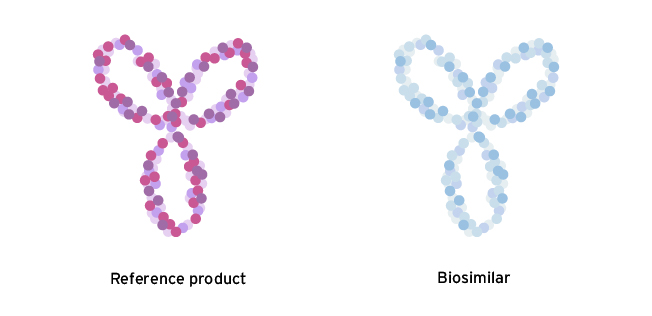Biosimilars

Fresenius Kabi has become a well-established provider of enhanced patient care and is now bringing this expertise to biosimilars in order to unlock life-changing biosimilar treatments for more patients.
Our comprehensive, high-quality oncology and immunology portfolio is similar by design to the reference biologics. We are committed to the effective and safe treatment of our patients, taking painstaking detail and using state-of-the-art analysis to ensure that these goals are met. For our biosimilar products to be approved, they are subjected to the following:1
- Comparative testing to the approved biologic drug
- Analytical studies proving that our biosimilar product is similar in molecular characteristics to the approved product
- Clinical studies clearly illustrating efficacy, safety, pharmacokinetics and pharmacodynamics comparable to the approved drug, in healthy volunteers and/or patient studies
Biosimilars are highly similar to reference biologics

A biosimilar is a product that offers the expected treatment benefits of an approved biologic drug (reference product). It is an equivalent version of an existing biologic that promises the same therapeutic behaviour.
Fresenius Kabi understands the importance of biosimilars and what they can bring to our patients’ lives. This understanding is the driving force behind our knowledge, expertise and commitment to the science of biosimilars.
We are committed to the effective and safe treatment of our patients, taking painstaking detail and using astute analysis to ensure that these goals are met. For our biosimilar products to be approved, they are subjected to comparative testing to the approved biologic drug, which involves:
- Analytical studies proving that our biosimilar product is similar in molecular characteristics to the approved product
- Clinical studies that confirm highly similar behaviour across pharmacokinetic profile, safety and efficacy
What are biosimilars? Learn here
Reference
1. European Medicines Agency (EMA). Biosimilars in the EU: Information guide for healthcare professionals. 2017. Available at:
http://www.ema.europa.eu/docs/en_GB/document_library/Leaflet/2017/05/WC500226648.pdf (Accessed February 2019).
FK/BIO/022/18 | February 2019
